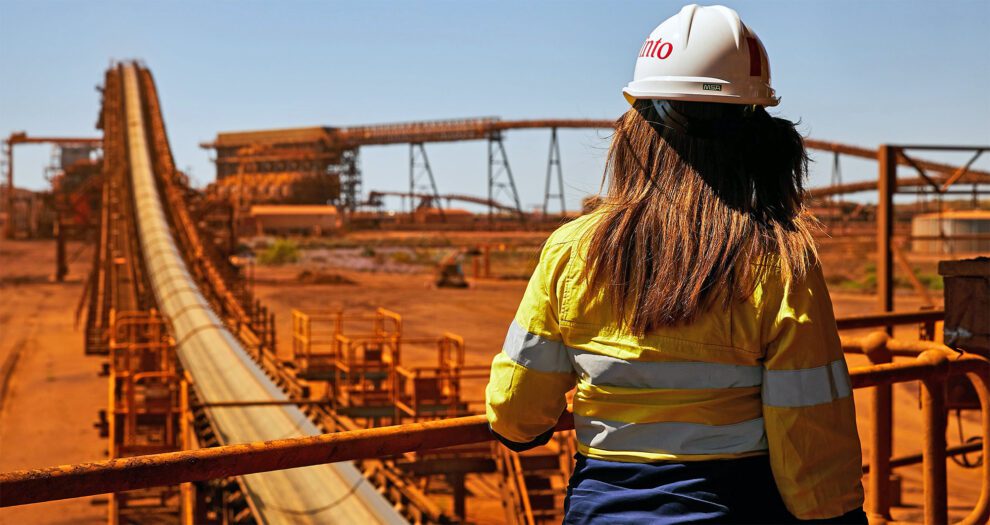A multinational resources company has confessed to providing a substandard environment to employees.
Rio Tinto confirmed 28.2 per cent of females and 6.7 per cent of males recently experienced sexual harassment in the workplace.
An eight-month review found 21 women claimed they experienced actual and attempted rape or sexual assault during the past five years at work.
Sex abuse alleged
The external investigation, led by former Sex Discrimination Commissioner Elizabeth Broderick, successfully substantiated one case of sexual assault and 29 cases of sexual harassment within Rio’s fly-in fly-out operations since the beginning of 2020.
“When I first started [here], one of the men … asked me for a blow job. I told his direct report and leader who said ‘I am sure he was just joking [and] we will make sure you are not alone with him,'” one victim said in the latest Report into Workplace Culture at Rio Tinto.
Other whistleblowers claimed they routinely avoided staff dining and exercise facilities, and outings due to bad experiences.
“There is no way I will go the mess or the gym when it is full [of men] … I often bring my dinner back to my room and eat in here, or just skip it altogether,” one woman said in the report.
“[While] walking to room in camp … [some] men [were] calling to me to join them for drinks [and] me politely declining then being called a frigid bitch,” another woman added. “Aggression is scary, there were five of them, big, strong males, and they were just outside my door. I felt intimated and unsafe.”
A different woman claimed she regularly phoned her husband, or brought a coworker, to feel safer while walking back to her accommodation.
“I had to walk past the bar, literally one metre from the bar, on a path approximately 50m-long to get to my room. The men would sit on the stools and watch every single female that walked past [and] some made comments [like] ‘what’s a hottie like you doing here’ and ‘do you come here often?’ and ‘god damn,'” she said.
“[I] would call my husband and say ‘I am walking past the bar please stay on the phone.’ I ended up feeling so uncomfortable that I started making sure I had a buddy to walk to dinner and back with every single night – even when it was not dark.”
Unlocked bathrooms
The review also found almost half of more than 10,000 Rio team members surveyed complained about suffering workplace bullying and sexism. Almost 80 per cent of the employer’s 45,000-strong workforce is male.
Respondents were most concerned about the lack of security in wash cabins. Management’s cavalier attitude towards modifying amenities allegedly forced multiple woman to walk long distances to a different bathroom.
“We have contractors walking in on us in our bathrooms; we have been demanding locks; we could not get a secure toilet; we do not have female bathrooms because we cannot lock the doors,” one employee said.
“We have raised the issue and we keep being told there is no money to do this. [Supervisors tell us to] ‘walk across the site to use a different bathroom’. The walk can be 20 minutes because the site is 2 kilometres long.”
Leadership questioned
Others expressed concern about the lack of empathy during supervisor interactions.
“I had another colleague in management who would constantly bring up that I had extra weight, would ask me if I ran … was on a diet and so on,” one woman said.
“I have been approached [in a sexual way] by leaders a number of times and never reported it,” another woman said.
Victims want management to action complaints and provide feedback in a timely manner. They hope this might reduce their “anxiety” and “fear of going to work”.
“[As] a victim of sexual harassment in the workplace, I was left to not only solve and manage … the problem myself but was also left in a hostile work environment with zero support from my management team to assist me in the situation, leaving me feeling unsafe and vulnerable,” one whistleblower said.
“I was never asked for a statement, was never reached out to by human resources, and was never given any formal information of the discussions had.”
Employees from a multicultural, gay, lesbian, bisexual, transgender or queer background also reported high rates of workplace bullying, harassment and discrimination.
‘Shame and enormous regret’
Rio chief executive Jakob Stausholm profusely apologised to every affected coworker and promised to foster a “safe, respectful and inclusive” work environment in future.
“I feel shame and enormous regret to have learned the extent to which bullying, sexual harassment and racism are happening at Rio Tinto,” he said in a public statement.
“I offer my heartfelt apology to every team member, past or present, who has suffered as a result of these behaviours. This is not the kind of company we want to be … [and] I am grateful to everyone who has come forward to share their experiences as we go about this vital work.”
The Western Australian Government separately established a new mental awareness, respect and safety program to address sexual harassment and assault across the mining industry.
An initial $1.9 million in taxpayer funding will boost mental health, drug and alcohol and other health and safety initiatives.
The State Department of Mines, Industry Regulation and Safety’s enforcement model and processes will handle allegations of sexual harassment and assault. The department will manage the program in partnership with the Mental Health Commission, Equal Opportunity Commission and State Women’s Interests Minister Simone Gurk.
Click here to read the full report.
Related articles
Mining giant failed to disclose positive result says whistleblower
Mining giant loses Fair Work dispute on COVID vaccine mandate
Mining giant will fire labour hire workers who refuse to relocate
Employer fined for not immediately reporting accident and ‘disturbing’ evidence














The Rio reports dont go far enough,investigations into the blantent discrimimation toward older workers also needs to be addressed as part of the bullying.
The thankyou to those who came forward is not genuine out in operations around the country the same managers are still in place and have been promoted to higher levels.
There really does need to be a class action against the company for all of the wrongs commited in the recent past.
Rio was once a great company to be part of and one of the top places to work anywhere in the world sadly one of the worst companys to be employed by today.
I have worked in mining for over two decades in all aspects of operational and management roles and as such I find this article is based on hearsay, wildly inaccurate in its depiction of the industry climate and incredibly one-sided and offensive in it’s agenda.
As a 57 year old male who has worked within the industry everywhere from Tanzania to Tasmania, in both contractor and client capacities, I have never witnessed such offensive behaviour, as described in this article, on any mine site. This is not to say that unacceptable behaviour has not occurred but it is certainly not the norm and nor is it tolerated, in all reported cases of unacceptable behaviour it is quickly investigated, addressed and the incident details and outcomes clearly communicated to all personnel.
Although the industry has historically been male orientated for 100’s of years it has enthusiastically embraced the revolutionary changes in diversity and inclusiveness over the past decade and although there is more to be done the Australian mining industry would undoubtedly be world leaders in this area.
It’s time we stopped the shame game and gender bias articles that only restrict the path of change and cloud the facts and start focussing on the positive affects these changes created in equality of opportunities available and the enrichment of lives it’s created.